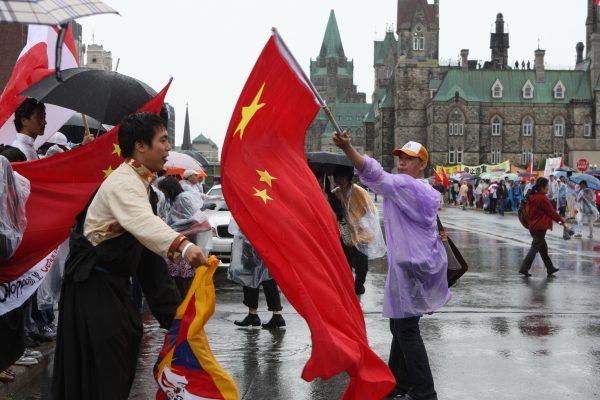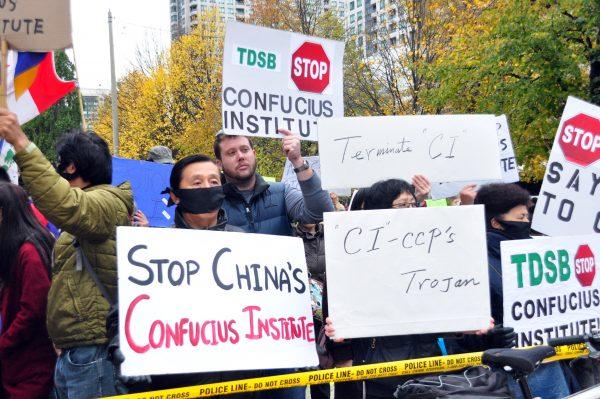There are several alarming examples of Beijing’s interference in Canada that show how deeply the Chinese Communist Party’s operations have penetrated the country, says China expert Charles Burton.
From the escalating harassment of Chinese human rights defenders in Canada, to the federal government’s delays in banning Huawei from Canada’s 5G networks, to the arbitrary imprisonment of Canadians Michael Kovrig and Michael Spavor in China, to recent threats by the Chinese Ambassador against Canadians in Hong Kong, Beijing’s influence is sweeping and pervasive, Burton says.
“Canada has so far proven to be one of the countries that China is able to achieve the most in terms of influence operations, and preventing Canada from opposing Chinese international activities incompatible with the international rules-based order and trade and diplomacy,” he said on The Epoch Times American Thought Leaders program on Oct. 25.
Burton, a senior fellow at Canada’s Macdonald-Laurier Institute, pointed to the recent case of Chinese Ambassador Cong Peiwu, who threatened Canada not to grant asylum to Hong Kong residents fleeing the city due to the national security law imposed by Beijing, saying it would amount to “interference in China’s domestic affairs.”
“That, in itself, is an indication of how severely penetrated Canada is, because we allow the Chinese regime to engage in thuggery and threatening behaviours such as we would not tolerate from any other country,” Burton said.
According to a report published last year by the National Security and Intelligence Committee of Parliamentarians, the Canadian parliamentary watchdog that oversees national security, Beijing maintains “significant and sustained foreign interference activities” in Canada.
This includes targeting the Chinese diaspora, seeking to corrupt political processes, manipulate Canadian media, and influence discourse on Canadian campuses in its favour.

As Canadians become increasingly wary of the CCP amid the pandemic—recent polls have found Canadians views of the CCP have plummeted since the outbreak began and the majority do not support expanding trade ties with China—Burton says much of Beijing’s interference in Canada stems from ties with business and political elites that forge channels of influence behind the scenes.
“You do have major Canadian firms who have extensive, lucrative relationships with Chinese communist business networks, who also have considerable influence at the most senior levels of government,” he said.
Academic Censorship Raises Alarm Bells
Burton warns that Beijing’s influence at academic institutions around the world also poses a serious threat to democracies, pointing to the recent case of a New Zealand professor being censored by her own university after publishing a report on the Chinese regime’s influence operations in New Zealand.Professor Anne-Marie Brady, a leading authority on Chinese communist influence, was put under investigation by the University of Canterbury after publishing research into how China’s People’s Liberation Army (PLA) exploited civilian channels for military purposes in New Zealand. The circumstances are suspicious, as Brady has been a target of the Chinese Communist Party for years, and her report cites evidence of PLA influence on academic research in New Zealand institutions.
“She’s shown that there are scholars at Canterbury and other New Zealand universities who seem to have an awful lot of connection to defence-related institutions in China,” Burton said.

Her research also claimed that a number of universities in New Zealand have links to Chinese telecom giant Huawei, and that some academics have participated in Beijing’s well-financed recruitment program, the Thousand Talents Plan, which has come under close U.S. scrutiny over possible threats to national security.
The investigation of Brady is being done by an “internal secret council” at the university without “the guarantees of due process of law,” says Burton, and if they rule against her, she could lose her university platform, ending much of her research work.
Burton recently spearheaded a letter, signed by over 250 China experts and academics worldwide, supporting the quality of Brady’s work. He also helped set up a crowdfunding platform to raise the estimated NZD$20,000 to pay for her legal fees.
Burton says that although there is no “smoking gun” tying the CCP directly to the case, the regime’s well-documented pattern of interference at academic institutions globally through Confucius Institutes and Chinese Student Associations, as well as evidence that they have harassed Brady directly—she’s had her home broken into and the brakes of her car were tampered with—makes the case highly suspicious.
“Professor Brady is a major cause of concern to the Chinese regime because of how well she has highlighted the concerns that governments should have about creeping Chinese influence into policy making circles, and into influential corporate elements in all of our societies,” Burton said.
“So it seems reasonable to assume that the Chinese diplomatic officials in New Zealand would be quite happy to see Professor Brady ceasing to function as a scholar in this area.”
New Zealand’s geopolitical “strategic potential” also makes it an especially attractive target for the Chinese regime in their influence operations, he says, which may also explain ongoing efforts to silence Brady.
“If China was able to gain, tip over, the balance of influence and become the dominant influence in New Zealand over, say, the United States and the western democracies, China could then use it for military and strategic purposes,” he said.
The outcome of Brady’s case could have widespread consequences for academic freedom in Canada and elsewhere, warns Burton.
“This is a very serious situation and one which all of us who are engaged in political science research on China are watching very carefully for fear that if this succeeds in silencing Professor Brady and preventing her from continuing her research, that comparable actions may be taken against professors and scholars in other countries doing the same thing.”

In May, a coalition of human rights groups including Amnesty International Canada, released a report on how Chinese authorities have exerted influence in Canada in order to censor China-related human rights work, titled “Harassment & Intimidation of Individuals in Canada Working on China-Related Human Rights Concerns.”
The report noted an increasing trend of interference, harassment, and intimidation on Canadian university campuses, with a “noticeable mobilization” of Chinese international students.
Alternative Markets
Burton believes Canada should be “looking at alternative markets and alternative ways to guarantee our security, because China is just not a reliable and good partner to be engaging with, both in terms of morality and in terms of just the trust basis.”This includes the question of whether to allow Huawei to participate in the country’s 5G networks—something Ottawa has yet to make a decision on.
“I mean, dealing with Huawei, aside from the fact that it can be used for espionage, do we really want to deal with the company that’s been complicit in putting in telecommunications installations that have led to the surveillance and persecution of important minority groups in China, right now in particular the Uighurs, but really everybody in China who’s been subject to this kind of repression?”
He said different countries’ responses to China seem to vary, but it could prove useful to discover why “Canada has proven to be such fertile soil for Chinese regime penetration.”
“As a researcher, I'd like to look into that a bit more and see if we can get to the bottom of it and find that perhaps there’s some policymakers who would be reluctant to continue collaborating with the Chinese regime, if their activities became more generally known.
“As I said, sunshine is the best disinfectant.”






